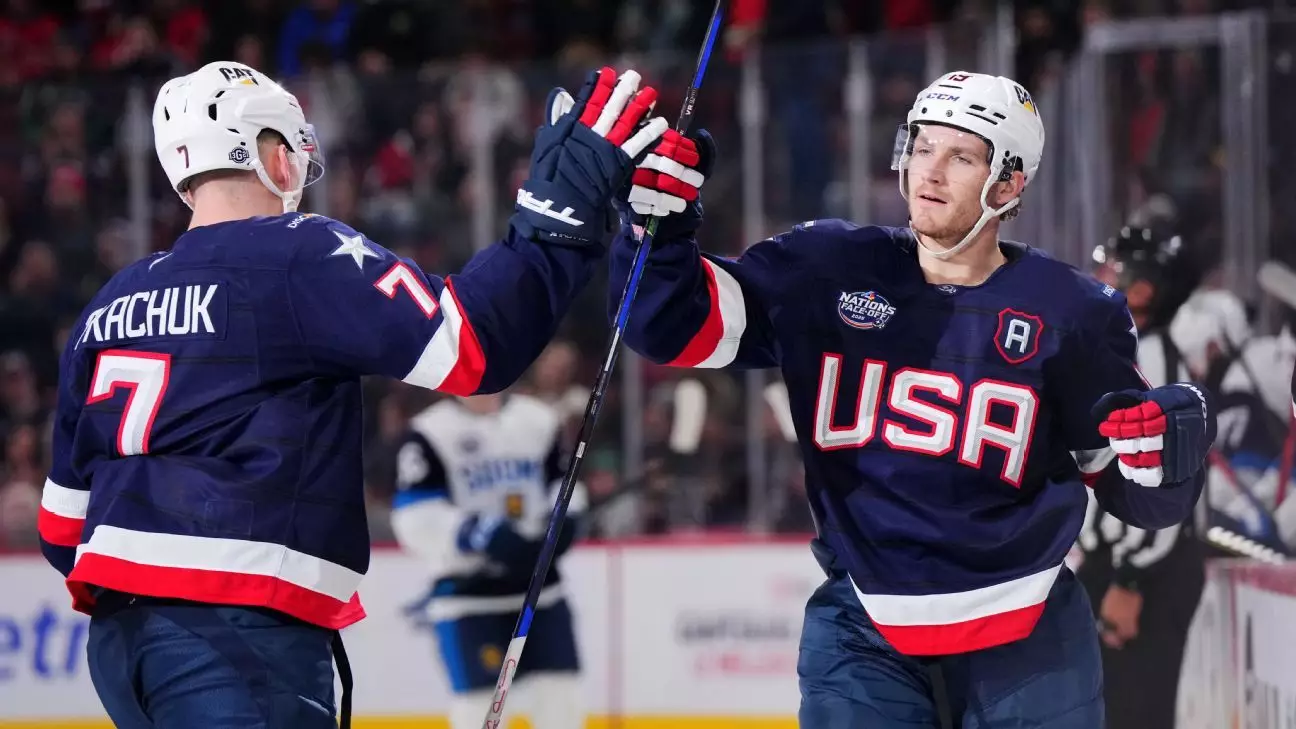In recent sporting events, particularly in the world of hockey, we have witnessed how politics can permeate even the most seemingly unrelated arenas. The NHL 4 Nations Face-Off championship game between the United States and Canada served as a backdrop where national pride met political discourse. The players found themselves discussing a controversial statement by President Donald Trump, who suggested that Canada could become the “51st state.” While one might expect hockey discussions to be constrained to strategies and performances, political dialogue has found its way into locker rooms and press conferences, compelling players to navigate these dual narratives in a high-stakes environment.
In the lead-up to this anticipated matchup, Team USA had the unique experience of receiving a phone call from President Trump. Players expressed a mix of fascination and pride in this unexpected show of support. Veteran forward Vincent Trocheck described the call as one of the “cooler experiences” he’d had, highlighting how surreal it was to engage with a sitting president. Other players echoed this sentiment, interpreting the call as a gesture of encouragement that was meant to uplift their spirits during a crucial tournament.
However, along with this thrill came a shadow of controversy. The mention of Canada potentially becoming a U.S. state stirred personal and political sentiments among players and fans alike. Team USA’s Zach Werenski admitted to “blacking out” during the phone call, a reflection of the overwhelming nature of the event. Yet, when pressed about potential comments on Canada’s status, he noted that the president opted not to delve into that specific topic, perhaps recognizing its sensitive nature.
The backdrop of this sporting event is steeped in complex political undertones. Recent political relations between the United States and Canada have not been without tension, and it became evident during the tournament. Fans were vocal, with instances of booing occurring during national anthems, a reflection of the underlying rivalry that transcends sports. These sentiments bubbled to the surface in previous encounters, where a physical altercation erupted in the first moments of the Canada-U.S. game, emblematic of the heightened emotions surrounding these national teams.
As the tournament progressed, it became clear that the fervor surrounding the matches was fueled not just by sport, but also by the geographical and ideological rivalry between the nations. Canada secured a rematch against the U.S. after defeating Sweden, intensifying the anticipation for their next clash, which had implications beyond the win-loss record.
Canada’s head coach, Jon Cooper, offered insights into how political narratives inevitably seeped into the players’ experiences. He acknowledged the discussions surrounding Canada becoming a “51st state,” even jesting about the idea of forming an unbeatable hockey team under such circumstances. More seriously, Cooper emphasized that despite the political undertones, the focus for the players remains on the game itself. He articulated that winning was paramount.
The coach’s reflections underscore a significant aspect of sports: while external factors can influence emotions and discussions, the essence of competition demands focus on performance. The narrative woven through the rivalry may stir passions, but at the end of the day, athletes must channel their energies into the game.
While the NHL 4 Nations Face-Off showcased the skills of elite athletes and the excitement of sports, it also served as a reminder of the interconnectedness of various spheres of life. The conversation surrounding Trump’s comments wasn’t merely a side note; it became part of a larger dialogue about identity and national pride within the sport. As Canada and the United States face off, they aren’t just reinforcing a competitive rivalry; they are also engaging in a cultural exchange, where questions of identity, allegiance, and pride come to the forefront.
The blending of sports and politics at the NHL 4 Nations Face-Off illustrates how major events can serve as conduits for national sentiment. As players and fans navigate these complex dimensions, the importance of unity within a shared passion for sport becomes more vital than ever in a politically charged atmosphere. The excitement of hockey remains, but its broader implications are what continue to engage and challenge both the athletes and their supporters.

